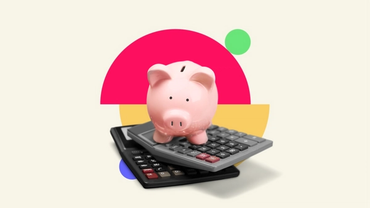5 things to do if you're stressed about money
By Boring Money
13 Mar, 2025
Financial stress is, at its heart, a state of worry, anxiety or emotional tension related to money, debt and upcoming or current expenses. Money is actually one of the most universal sources of stress and can be stressful - in different ways - both for those who have a lot and those who don't have enough.

Chartered Financial Designer Rachel Efetha delivered an exclusive webinar for Boring Money about how to identify and manage stress related to money, including resources you can access for help and some simple steps to getting your finances back on track.
Watch the full video below to hear Rachel’s expert insights, then scroll down for our list of the things you need to do if you’re feeling stressed about money.
Money and managing financial stress
What are the symptoms of financial stress?
Feeling stressed about money may make you feel tense, panicky and even interfere with your sleep or study. In fact, there’s a growing wealth of evidence that stress about your financial circumstances can have a marked impact on your health. This can manifest in many different ways. For some, it can be severely disruptive to their daily life.
In an effort to deal with this stress, many people turn to unhealthy coping mechanisms such as alcohol and drug abuse, developing eating disorders and gambling.
But for many, stress about money can be more subtle. It may feel like a nagging worry at the back of your mind when you tap your card to pay for your shopping, or guilt that you aren’t able to afford to buy a gift for a loved one’s birthday.
How common is financial stress?
If you can relate to any of the symptoms of financial stress listed above, you’re not alone. The cost of living crisis has seen the price of everyday items skyrocket and many households have been forced to make difficult decisions about their finances.
To get a sense of how widespread financial stress is, a 2024 survey of UK adults by the National Debtline found that:[1]
Nearly one in two (47%) UK adults - 24.9 million - are worried about their finances
One in eight (13%) people in debt say they are scared of opening their post or emails because of what they owe
One in nine (11%) feel they have no one to talk to about their situation
3.1 million (23% of those in debt) feel embarrassed about their financial situation, with one in six (18%) having not told anyone about their debt
Meanwhile, a separate study by Virgin Money in 2023 revealed "nearly nine in 10 (88%) Brits say that thoughts about money impact their sleep in some way". It also indicated that women are more likely to be affected, with more women (91%) experiencing sleep disruption than men (85%).[2]
Mark Rowland, Chief Executive of the Mental Health Foundation, explains how financial pressure is one of the key drivers of the UK's anxiety epidemic.
There are clear links between financial strain and poor mental health and for people experiencing both they are faced with a double taboo. We don’t like to talk about money matters and the perceived stigma about mental health is stopping many of us from talking about our problems. The cost-of-living crisis has exacerbated both financial strain and poor mental health, creating a public mental health emergency.
5 things to do if you’re stressed about money
So what can you do if you're feeling the pressure? Fortunately, for the vast majority of people, there are steps you can take to improve your financial situation (and your mental health). Here's where to start:
1. Don’t panic
Whatever situation you find yourself in, it's important to stop, take a step back and breathe. Don't beat yourself up about it because you can't change what's done. The thing you can change, however, is what you do from this point onwards. So be kind, forgive yourself for past mistakes and try to approach things with a clear head.
This is the stage where it’s crucial to seek help if you feel you need it. If your head is swimming with overwhelming thoughts, it might be difficult to think clearly. Getting help could be anything from confiding in a trusted friend or family member, speaking to a health professional like your GP, or reaching out to a free charity such as the Samaritans.
2. Focus on the most important bills
In periods of financial stress, prioritisation is key. You may not be able to get out of your situation overnight, but you may be able to identify where to start and make a plan of action to tackle your most pressing bills first.
For most people, these will be things like your mortgage or rent, utilities and groceries. The instances where there will be implications if you don’t keep up with your payments, such as repossession, bankruptcy, etc. For example, if you don’t pay your council tax, you can be summoned to court – so it’s worth prioritising this.
If you’re not sure which bills are most important, the government’s MoneyHelper service has a handy bill prioritiser which can help you put your bills and payments in the right order. Then you can start tackling them from most to least important.
3. Consider a 0% balance transfer credit card
If you’ve got a number of different debts that need to be repaid and it’s becoming a pain trying to keep track of them all, it may be worth getting a 0% balance transfer credit card. These helpful and often-overlooked credit cards allow you to consolidate existing debt from other cards onto a single, new one which charges 0% interest. This can enable you to focus on repaying your underlying debt without having to worry about keeping up with the interest on top.
Beware that there is often an initial transfer fee, usually between 1-3% of the total value of debt you’re putting on the card, and the 0% interest tends to be for a limited time only. However, the interest-free period can be as long as 30 months or more, giving you an extended period to focus on getting on top of your debt without accruing large amounts in interest along the way.
It’s crucial to make sure you repay the debt before the end of the interest-free period, however, as the rates can quickly skyrocket after it ends – many are around 25% but can be higher than 30%.
Rates and interest-free periods differ vastly from provider to provider so it’s well worth shopping around to find the best deal. Comparison websites such as MoneySuperMarket and Compare the Market are good places to start.
4. Get support
If you’re in a position where you’re unable to cover the cost of essential expenses, then it’s time to get some support. This could involve claiming certain benefits that you’re eligible for, getting ‘welfare assistance’ from your local council to help you pay for basic costs, or contacting your bank if you’re struggling to repay an overdraft.
Check which benefits you could get
To find out which benefits you may be eligible to receive, head over to entitledto’s handy, free benefits calculator. You’ll need to provide information about your income, outgoings, savings, pensions, any existing benefits and your Council Tax bill, so make sure to gather any relevant paperwork together first. It will give you an estimate of:
Which benefits you could get
How much your payments could be
How your benefits could be affected if your employment status changes
Get welfare assistance from your local council
You may be able to get help from your local council to cover essential costs via a welfare assistance scheme or the Household Support Fund. Depending on your eligibility, you could get help with the cost of:
Your energy and water bills
Your food and groceries
Essential items - for example, clothes
You don’t have to be currently claiming benefits to be eligible, and if you are, they won’t be affected if you start receiving money from a welfare assistance or Household Support Fund scheme.
To apply, you’ll need to contact your local council and ask if they offer welfare assistance or a Household Support Fund scheme. You can find out how to contact your local council on the gov.uk site here.
Contact your bank about your overdraft
Finally, in certain circumstances, you may be able to contact your bank and have them help you pay back your overdraft. This could help to take some of the pressure off so you can get organised. Though there are no guarantees, your bank may:
Temporarily pause interest or fees on your overdraft
Let you pay for essential outgoings before paying off your overdraft
You have a legal right to use your own income to cover the cost of your bills and day-to-day expenses. This is called the ‘first right of appropriation’ and it may help you to mention this to your bank if they’re not allowing you to use your income to pay for your essential bills.
If your bank sends you a default notice – which happens if you don’t pay back your debt – you may still be able to arrange a repayment plan with them before they close your account or take further action. Beware though that you must either pay back your debt or reach a repayment agreement within 2 weeks of the default notice or your bank can take you to court.
5. Apply for Breathing Space
If you’re still struggling to cover the cost of important bills, consider applying for Breathing Space (also called the Debt Respite Scheme). This debt relief scheme can give you temporary protection from creditors if you’re unable to keep up with payments.
If you’re eligible, it can be used to freeze interest, fees and charges on debts and pause contact and enforcement action from creditors for a short while to give you time and space to get on top of your finances.
There are two types of Breathing Space you can apply for: Standard and Mental Health Crisis.
Standard Breathing Space – You apply for this via debt advice. It lasts for up to 60 days, with a review between days 25 and 35.
Mental Health Crisis Breathing Space – This is specifically for people in mental health crisis treatment and can only be applied for with an Approved Mental Health Professional (AMHP). It lasts for the duration of your treatment (no matter how long), plus 30 days.
To apply for the Breathing Space scheme, an application has to be submitted on your behalf by a debt advice provider authorised by the Financial Conduct Authority (FCA) to offer debt counselling, or a local authority which provides debt advice to residents. If you’re receiving mental health treatment and can’t speak to a debt adviser, someone else can do it for you.
It’s free to apply for Breathing Space – though be aware that some debt advisers may charge you a fee to do it for you. There are also some eligibility rules to keep in mind. To be eligible for Breathing Space, you must:
Not have a debt relief order (DRO), an individual voluntary arrangement (IVA), an interim order, or be an undischarged bankrupt at the time you apply
Not already be using the Breathing Space scheme
Not have used the Breathing Space scheme in the previous 12 months (unless it was for a mental health crisis)
Don’t feel ashamed about seeking help
Remember that tens – if not hundreds – of thousands of people around the UK feel stressed about their finances and this number only continues to grow. There’s no shame in reaching out for support, whether it’s as simple as talking to family or friends or getting in touch with a debt advice service to help you formally apply for Breathing Space. In any case, remember that there’s an abundance of resources out there that can help you get back on track.
---
[1] National Debtline, January 2024





